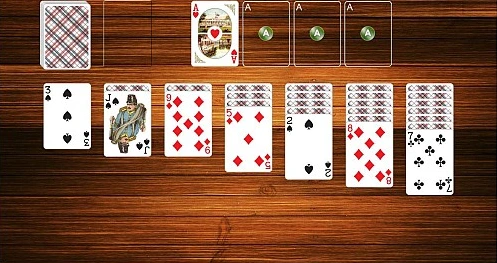Solitaire Games: Ultimate Relaxation and Strategic Fun
Solitaire games are like little puzzles waiting for you to solve! Imagine yourself enjoying a warm afternoon with a deck of cards in your hands, a cup of your favorite beverage, and sunlight coming in through the window. Every game is an enjoyable task that requires you to utilize organization and strategy in your head.
Regardless of your skill level, solitaire has the ability to transform an ordinary moment into an exhilarating journey. As you try to clear the table and unearth hidden gems, you’ll find yourself shuffle cards and enjoying every move. Are you prepared to explore the realm of solitaire? Together, let’s explore the joy!
The Allure of Solitaire Games
A Brief History of Solitaire Games
The history of solitaire games is extensive, spanning several centuries. The 18th century saw the creation of the earliest variants, which were mostly in France and Germany. Initially, they were played mostly for leisure by members of the higher classes using standard card decks. Many versions of these games appeared as their popularity increased, giving rise to the wide variety of solitaire games available to us today.

The development of technology brought about a significant change in solitaire games. Millions of people were able to play Solitaire after personal computers became widely available in the 1980s. This change not only made the game more well known but also made it possible for new variants and styles to emerge. Players can now experience the timeless challenge of solitaire games while selecting from traditional formats or contemporary twists.
Furthermore, the timeless appeal of solitaire is derived from its adaptability and ease of use. These games require players to use a special combination of luck and strategy, whether they are played alone or in a competitive setting. Both casual gamers and gaming historians will find solitaire games to be an interesting subject of discussion due to its evolution, which mirrors shifting society trends.
Different Variations of Solitaire Games
Variety is the essence of life, especially when it comes to solitaire games. The classic variant of Klondike, known as Traditional Klondike, demands players to manage a limited amount of movements while arranging cards in a specified order. However, there are innumerable varieties, each posing fresh guidelines and difficulties. Every game, from Spider to FreeCell, has a unique element that keeps players from getting bored.
Pyramid Solitaire is a well-liked variation in which the cards are stacked in a pyramidal pattern. It’s a fun brain game where the goal is to match pairs that sum up to 13. TripPak’s is an additional thrilling option that combines numerous peaks and makes for a more engaging gaming experience. These various iterations stimulate players’ creativity and maintain the interest level of solitary games.

Multiplayer solitaire games have also become popular for individuals seeking a cooperative gaming experience. In order to overcome obstacles together, players can form teams and plan strategies while fostering a sense of camaraderie. No matter your preference or ability level, there is something for everyone in this wide selection of solitaire games.
The Benefits of Playing Solitaire Games
Playing solitaire games has several mental advantages in addition to being entertaining. These games improve critical thinking and help to hone problem-solving abilities. A greater comprehension of cause and effect is developed by players as they plan ahead and plot their moves; this understanding can be applied in real-life circumstances.
Games of solitaire are also a great way to sharpen attention and concentration. Players must pay close attention for prolonged periods of time in order to keep track of numerous cards and their possible placements. Solitaire is an important personal development tool since it helps improve attention, which is beneficial in both professional and academic contexts.
Finally, playing solitaire games can be a great way to decompress. Sorting cards is a repeated task, and clearing the table feels good. These factors can make the process contemplative. Spending some time playing solitaire can be a much-needed diversion in today’s hectic environment, encouraging calmness and focus.
Tips and Strategies for Winning Solitaire Games
Strategy and planning are typically the keys to mastering solo games. Finding hidden cards initially is always a crucial piece of advice. This strategy broadens your options and could result in surprising pairings. Additionally, since open slots give you more options for how to arrange your cards, giving priority to moves that clear spaces can be very important.
Another good tactic is to plan several steps ahead of time. Even while it could be tempting to act on impulse, pausing to consider your options can make gaming more enjoyable. Keeping track of the cards you’ve played and the ones that are still in the deck can provide insightful information that will help you come up with more clever plans.
In the end, perfection comes from practice. You’ll get better at spotting trends and creating winning strategies the more solitaire games you play. Accept every game as an opportunity to learn, and don’t be afraid to try out various tactics. You will become skilled at even the most difficult solitaire variations with persistence, patience, and time.
Digital Solitaire: The Future of Gameplay
Video games like solitaire also keep up with technological advancements. These vintage tasks are now easier to reach than ever because to the popularity of mobile gaming. Solitaire games are now available on smartphones and tablets, enabling players to play for little periods of time during breaks or commutes. Due to its convenience, solitaire has seen a rise in popularity, drawing in new players from younger generations.
Improved features are another way that digital solitaire improves the play experience. Online leaderboards, data tracking, and lessons are all features found in many apps. Because users may connect with people all around the world, this competitive element promotes a sense of community. These typically solitary games receive an additional level of excitement from the option to compete against friends or strangers.
To keep the gaming interesting, developers are also always coming up with new and inventive versions and interactive features. The immersive experiences that augmented reality (AR) and virtual reality (VR) offer change the way players interact with solitaire games. These technologies are starting to become noticeable. The future of solitaire looks to be just as exciting and compelling as its illustrious past if these developments keep up.







